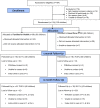Randomised controlled trial and economic evaluation of the 'Families for Health' programme to reduce obesity in children
- PMID: 28003178
- PMCID: PMC6234231
- DOI: 10.1136/archdischild-2016-311514
Randomised controlled trial and economic evaluation of the 'Families for Health' programme to reduce obesity in children
Abstract
Objective: Evaluating effectiveness and cost-effectiveness of 'Families for Health V2' (FFH) compared with usual care (UC).
Design: Multicentre randomised controlled trial (RCT) (investigators blinded, families unblinded) and economic evaluation. Stratified randomisation by family; target of 120 families.
Setting: Three National Health Service Primary Care Trusts in West Midlands, England.
Participants: Overweight or obese (≥91st or ≥98th centile body mass index (BMI)) children aged 6-11 years and their parents/carers, recruited March 2012-February 2014.
Interventions: FFH; a 10-week community-based family programme addressing parenting, lifestyle change and social and emotional development. UC; usual support for childhood obesity at each site.
Main outcome measures: Primary outcomes were 12-months change in children's BMI z-score and incremental cost per quality-adjusted life-year gained (QALY). Secondary outcomes included changes in children's physical activity, fruit and vegetable consumption and quality of life, parents' BMI and mental well-being, family eating/activity, parent-child relationships and parenting style.
Results: 115 families (128 children) were randomised to FFH (n=56) or UC (n=59). There was no significant difference in BMI z-score 12-months change (0.114, 95% CI -0.001 to 0.229, p=0.053; p=0.026 in favour of UC with missing value multiple imputation). One secondary outcome, change in children's waist z-score, was significantly different between groups in favour of UC (0.15, 95% CI 0.00 to 0.29). Economic evaluation showed that mean costs were significantly higher for FFH than UC (£998 vs £548, p<0.001). Mean incremental cost-effectiveness of FFH was estimated at £552 175 per QALY.
Conclusions: FFH was neither effective nor cost-effective for the management of obesity compared with UC.
Trial registration number: ISRCTN45032201.
Keywords: Evidence Based Medicine; Nutrition; Obesity; Parenting.
Published by the BMJ Publishing Group Limited. For permission to use (where not already granted under a licence) please go to http://www.bmj.com/company/products-services/rights-and-licensing/.
Conflict of interest statement
Competing interestsNone declared.
Figures



References
-
- Health Survey for England—2013. Chapter 11: Children's BMI, Overweight and Obesity. Health and Social Care Information Centre 2014. http://www.hscic.gov.uk/catalogue/PUB16076 (accessed 18 Sep 2015).
-
- Health and Social Care Information Centre. National Child Measurement Programme, England, 2014/15. 2015. http://www.hscic.gov.uk/catalogue/PUB19109 (accessed 15 Jun 2016).
Publication types
MeSH terms
Grants and funding
LinkOut - more resources
Full Text Sources
Other Literature Sources
Medical
